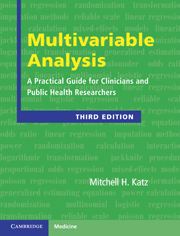Book contents
- Frontmatter
- Contents
- Preface
- 1 Introduction
- 2 Common uses of multivariable models
- 3 Outcome variables in multivariable analysis
- 4 Independent variables in multivariable analysis
- 5 Relationship of independent variables to one another
- 6 Setting up a multivariable analysis
- 7 Performing the analysis
- 8 Interpreting the results
- 9 Delving deeper: Checking the underlying assumptions of the analysis
- 10 Propensity scores
- 11 Correlated observations
- 12 Validation of models
- 13 Special topics
- 14 Publishing your study
- 15 Summary: Steps for constructing a multivariable model
- Index
- References
5 - Relationship of independent variables to one another
Published online by Cambridge University Press: 01 April 2011
- Frontmatter
- Contents
- Preface
- 1 Introduction
- 2 Common uses of multivariable models
- 3 Outcome variables in multivariable analysis
- 4 Independent variables in multivariable analysis
- 5 Relationship of independent variables to one another
- 6 Setting up a multivariable analysis
- 7 Performing the analysis
- 8 Interpreting the results
- 9 Delving deeper: Checking the underlying assumptions of the analysis
- 10 Propensity scores
- 11 Correlated observations
- 12 Validation of models
- 13 Special topics
- 14 Publishing your study
- 15 Summary: Steps for constructing a multivariable model
- Index
- References
Summary
Does it matter if my independent variables are related to each other?
As discussed in Section 1.1, the strength of multivariable analysis is its ability to determine how multiple independent variables, which are related to one another, are related to an outcome. We would not need multivariable analysis to determine the independent effect of exercise on mortality if it weren't for the fact that exercise, smoking, age, hypertension, and cholesterol level were all related to each other and the outcome of interest. Multivariable analysis helps us to separate the effects of these different variables on outcomes such as mortality.
However, if two variables are so closely correlated that if you know the value for one variable you know the value of the other, multivariable analysis cannot separately assess the impact of these two variables on the outcome. This problem is called multicollinearity. I can best illustrate it with an extreme example.
Let's say you were studying factors that affected length of hospital stay among patients with pneumonia. At your hospital, to accommodate the different preferences of the staff, the nurses record patients' temperature in both Fahrenheit and Celsius. When you do your medical abstraction, you record both Fahrenheit and Celsius temperatures. If you entered both variables in a model assessing length of stay, your model would be incorrect, and you would get an error message or unpredictable answers. This is because temperature in Celsius and temperature in Fahrenheit is the same variable even though the numbers are different.
Information
- Type
- Chapter
- Information
- Multivariable AnalysisA Practical Guide for Clinicians and Public Health Researchers, pp. 88 - 92Publisher: Cambridge University PressPrint publication year: 2011
References
Accessibility standard: Unknown
Why this information is here
This section outlines the accessibility features of this content - including support for screen readers, full keyboard navigation and high-contrast display options. This may not be relevant for you.Accessibility Information
- 7
- Cited by
